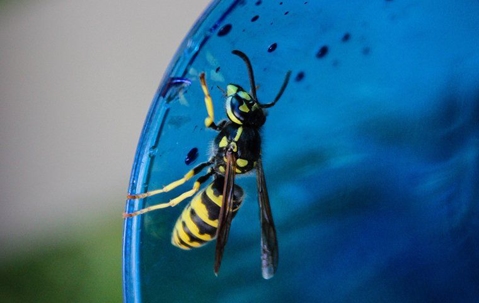Pest control in Long Island encompasses various challenges, and one of them is effectively managing wasps. These stinging insects not only disrupt outdoor activities but also pose a threat to individuals with allergies. In order to ensure a wasp-free environment, it is crucial to implement efficient wasp control strategies.
In this article, we explore practical steps to keep different types of wasps away. From sealing potential entry points to eliminating food sources, we will cover essential measures for wasp prevention.
Wasp Identification Tips: Behaviors To Help You Identify Wasps
Accurate wasp identification is essential for effective Pest Control. Understanding wasp behavior can assist in identifying these stinging insects.
Wasps have slender bodies with distinct narrow waists and vibrant yellow and black markings. Unlike bees, wasps can sting multiple times, making them more dangerous. They construct nests in various locations, including trees, eaves, and underground burrows.
Observing their flight patterns and nest characteristics can aid in distinguishing different types of wasps, such as paper wasps, yellow jackets, and hornets. By familiarizing yourself with these wasp identification tips, you can take appropriate measures to manage and control wasp infestations.
Health Risks Of Wasp Infestations: Allergies And Other Concerns
If you want to control wasps successfully, understanding the potential health risks they pose is crucial. Allergies are a significant concern, as wasp stings can trigger severe reactions in sensitive individuals. An allergic response can result in difficulty breathing, swelling, and even anaphylaxis, a life-threatening condition.
Beyond allergies, repeated stings from aggressive wasps can cause pain, inflammation, and infection. Moreover, having wasp nests near residential areas increases the risk of accidental encounters and stings.
In order to protect your health and well-being, it's essential to address wasp infestations promptly and employ effective measures to control wasps in and around your property.
Effective Wasp-Proofing: Practical Tips To Prevent Wasp Infestations
Wasp prevention is one of the top ways to maintain a wasp-free environment. Here are some practical home Pest Control tips to follow which will help minimize the risk of wasp infestations:
Inspect your property for gaps, cracks, and openings and seal them properly, including gaps around windows, doors, and utility entry points.
Keep outdoor garbage bins tightly sealed and clean up food spills promptly to eliminate potential food sources that attract wasps.
Regularly trim trees, shrubs, and hedges near your property to prevent the formation of nests and discourage wasps from building nearby.
Place commercial or homemade wasp traps in strategic locations to lure and capture wasps, reducing their population.
Planting certain herbs like mint, basil, and thyme can act as natural repellents to deter wasps from nesting nearby.
If you have a persistent wasp problem or a large infestation, it's best to contact a professional Pest Control service to safely and effectively control wasps.
Learning how to control wasps and following these tips can significantly reduce the chances of encountering wasp infestations and enjoy a wasp-free living environment. Take advantage of them!
Safe and Effective Wasp Removal: Contact Us Right Away!
The best way to get rid of wasps in Long Island is to enlist the help of our experts at Ultimate Pest Control. We specialize in safe and effective wasp removal, ensuring the well-being of your property and loved ones.
Our professional team has the knowledge, tools, and experience to handle even the most challenging wasp infestations. Whether you're dealing with a single wasp nest or a widespread problem, our experts will swiftly eliminate the threat.
Don't compromise your safety. Contact Ultimate Pest Control today for prompt and reliable wasp removal services in Long Island.

